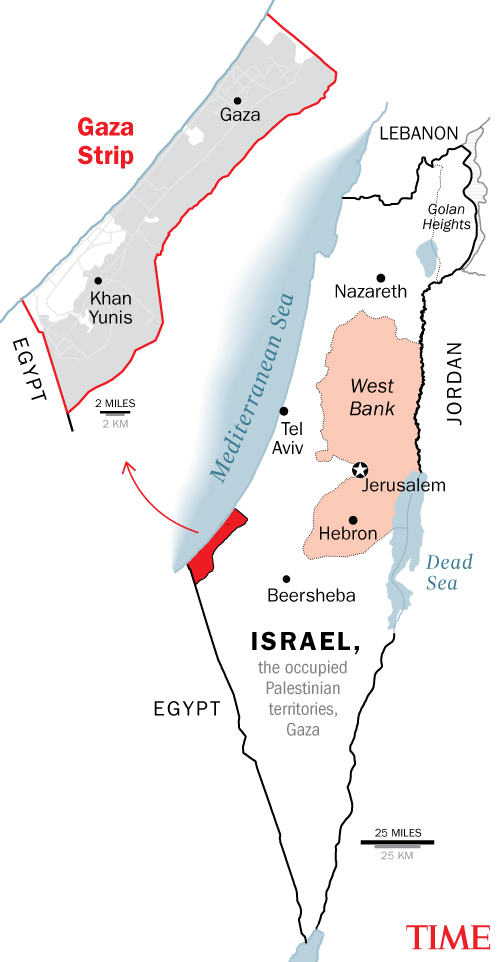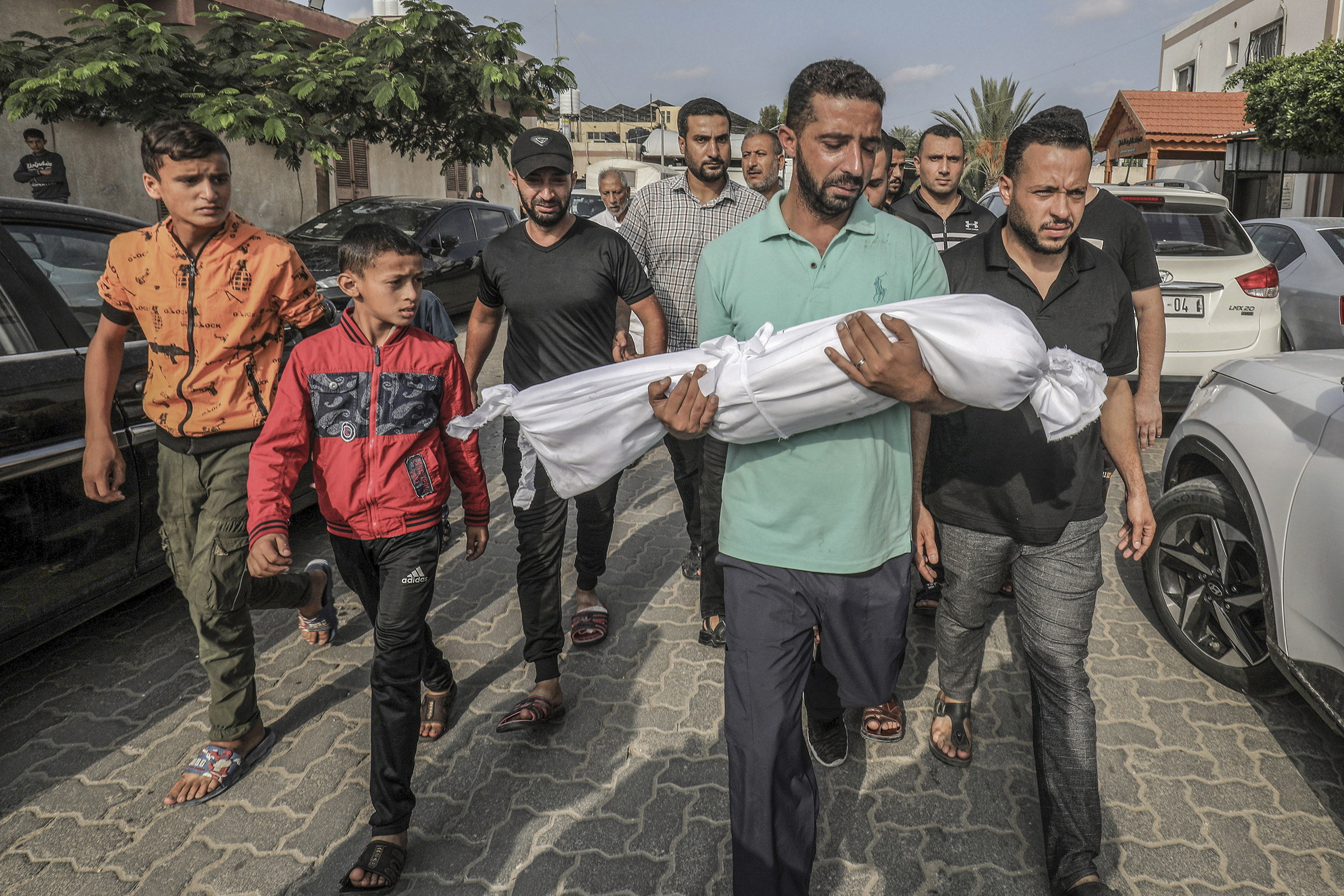In the aftermath of the Sept. 11, 2001 attacks, the U.S. launched major wars in Afghanistan and Iraq. Now, as Israel reels from a surprise attack by Hamas that the country has come to describe as its own 9/11, it is beginning a new war in Gaza, the Palestinian territory ruled by the militant group. This conflict, which has already seen heavy shelling and could yet involve a ground invasion, stands to have a devastating impact on the densely-populated enclave and the millions of Palestinians who live there.
To understand what such a war would look like on the ground, one must understand the situation in Gaza itself. The Gaza Strip is a small seaside enclave roughly twice the size of Washington, D.C. that is wedged between Israel and Egypt. It is the smaller of the Palestinian territories (which also include the Israeli-occupied West Bank and East Jerusalem)—and the most besieged. For more than a decade, the Gaza Strip has been described by human-rights groups and United Nations experts as the world’s largest open-air prison. Although not formally occupied like the West Bank (Israel withdrew its soldiers and settlements from Gaza in 2005), its borders are tightly controlled by Israel and Egypt, restricting the movement of its more than 2 million Palestinian inhabitants. The majority of people living there are descended from Palestinian refugees who were violently expelled from their homes and native villages in what is now modern-day Israel, amid the war that resulted in the state’s creation in 1948.

In the wake of the Hamas attack over the weekend, in which militants infiltrated Israeli communities bordering Gaza, killing more than 1,000 Israelis and taking at least 150 hostages, the Israeli government on Monday announced that it would be imposing a “complete siege” on Gaza, where basic necessities such as water and electricity are supplied by Israel. Yoav Gallant, Israel’s defense minister, said that there would be “no electricity, no food, no fuel, everything is closed,” in retaliation for Hamas’s deadly attack. Observers and human-rights groups have warned that the siege, paired with the airstrikes that have already killed 830 Palestinians, will have a devastating impact on Gaza’s already-reeling civilian population. Experts tell TIME that the Israeli government’s recent decision to mobilize an unprecedented 300,000 reservists suggests that a wider ground invasion may also be in the cards.
Read More: A Survivor Recounts the Horror of the Hamas Attack on Israel's Supernova Festival
“I do expect the airstrikes are but a preamble, however devastating they are—and they are—for a massive land operation,” says Nimrod Novik, who was a senior advisor to ex-Israeli Prime Minister Shimon Peres.
For Palestinians living in Gaza, roughly half of whom are children, the situation “is going from terrible to catastrophic,” Shira Efron, the director of policy research at Washington’s Israel Policy Forum and a former consultant with the U.N. country team advising on Gaza. The 16-year Israeli blockade, which is backed by Egypt, severely restricts the movement of goods and people in and out of the Strip. Efron says that nearly two-thirds of Gazan households receive humanitarian assistance, the vast majority in the form of food assistance and that 65% of the population is moderately or severely food insecure. As Israel cuts off food and fuel from entering Gaza, and as some European capitals announce plans to halt bilateral assistance to the Palestinians pending review of how their aid is being spent, that already grim humanitarian situation is bound to get even worse, Efron says.
Read More: How the World Leaders Have Reacted to Hamas’ Surprise Attack on Israel
And that’s before one takes into account the state of Gaza’s physical infrastructure, which has already come under heavy fire as Israeli airstrikes bombard targets within the crowded enclave, including refugee camps, hospitals, and mosques. While the Israeli government says that it is targeting Hamas, in an area as densely populated and restricted as Gaza, civilians have nowhere else to go. (Indeed, Israeli Prime Minister Benjamin Netanyahu’s warning to Palestinians in Gaza to “leave now” raised questions about where civilians could escape to.) The last time Israel launched a ground operation in Gaza—in 2014—more than 2,000 Palestinians were killed, a majority of them civilians.

“I’m in daily contact with all of my friends [in Gaza], and they’re all terrified,” says Diana Buttu, a Haifa-based Palestinian analyst and former legal advisor to the Palestine Liberation Organization and Palestinian negotiators who lived in Gaza between 2005 and 2006. She notes that the language used by Israeli politicians—from Netanyahu’s vow to turn Hamas hiding places in Gaza into “rubble” to the more euphemistic references to periodic operations in the region as “mowing the grass”—dehumanizes the Palestinians living in the Strip. “They’re talking about committing mass atrocities and they’re talking very openly about it,” she says. “In the past, the Israelis used to say ‘precision strikes,’ but this is all off the table now. Instead, they’re talking about strangling Gaza.”
Read More: Israel's President: Our Darkest Hour Casts a Shadow on the Entire World
While Israel has not officially announced a ground operation in Gaza, longtime observers believe that it is now inevitable. Novik, a member of the executive committee of Commanders for Israel’s Security—an organization comprised of former senior security officials—and his colleagues have long criticized the Israeli government’s strategy vis-a-vis Gaza, which he describes as “a policy of allowing Hamas to solidify its control over the Gaza Strip while weakening the Palestinian Authority in the West Bank.” The West Bank is governed by Hamas’s political rivals Fatah, headed by Palestinian President Mahmoud Abbas. But none of the observers TIME spoke with expect that Israeli citizens will pressure their government to change course regarding the Palestinians—at least, not right away. “All of that is really over the horizon because the horizon right now is a dark one of a prolonged war,” says Novik. “We are at a point where a massive military show of force is essential and unavoidable.”
More Must-Reads from TIME
- Caitlin Clark Is TIME's 2024 Athlete of the Year
- Where Trump 2.0 Will Differ From 1.0
- Is Intermittent Fasting Good or Bad for You?
- The 100 Must-Read Books of 2024
- Column: If Optimism Feels Ridiculous Now, Try Hope
- The Future of Climate Action Is Trade Policy
- FX’s Say Nothing Is the Must-Watch Political Thriller of 2024
- Merle Bombardieri Is Helping People Make the Baby Decision
Write to Yasmeen Serhan at yasmeen.serhan@time.com